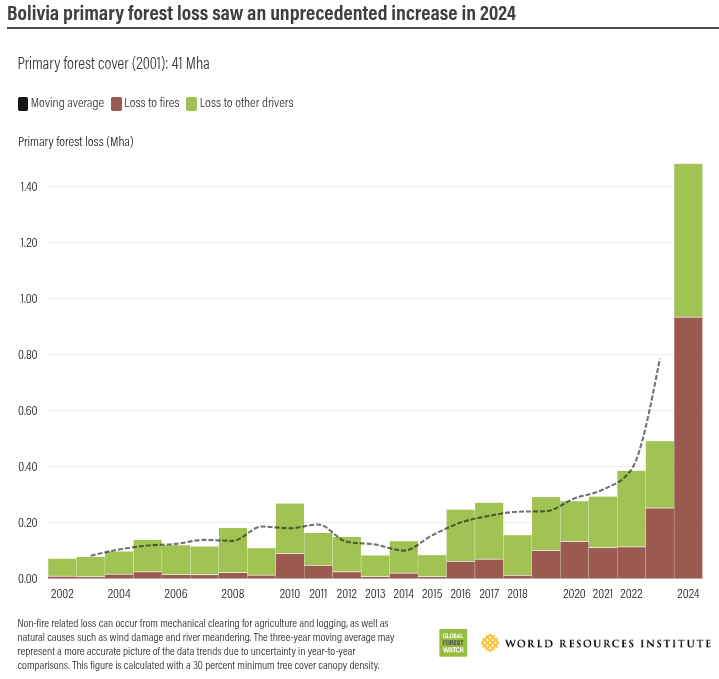Bolivia Burning: Inside a Latin American ecocide
A new documentary film by the Gecko Project. Coming soon.
“We are on the edge of a precipice. If we continue in the same way we’re going to fall into that precipice.” That’s from the trailer for a new film by the Gecko Project about the rapid destruction of Bolivia’s forests.
Bolivia has lost record breaking areas of forest for the past four years. In 2023, the country lost 490,000 hectares of primary forest. Another record broken. But in 2024, the area of primary forest lost increased by a staggering 200%, reaching 1.48 million hectares. Bolivia’s loss of primary forest in 2024 was second only to Brazil.
In a recent report about the forest fires of 2024, Fundación TIERRA estimates that wildfires burned an area of 12.6 million hectares in Bolivia. It was the country’s worst-ever fire season.
The fires in the department of Santa Cruz in Bolivia’s eastern lowlands, near Brazil, were particularly extreme. Fires in Santa Cruz accounted for 68% of the damage. More than two-thirds of the country’s cultivated land is in the eastern lowlands.
Most of the fires were set deliberately, caused by illegal burning in protected areas and Indigenous territories, as well as land cleared for industrial agriculture.
Bolivia Burning
The Gecko Project’s new film follows Bolivian human rights lawyer Alvaro Bozo García and British journalist David Hill as they travel through the eastern lowlands of Bolivia.
The Gecko Project has released a two minute trailer for the film:
From 19 June 2025, the film-makers will be hosting a series of screenings of the film in Bolivia. Activists, conservationists, journalists, and politicians will be invited.
The Gecko Project is also open to others hosting screenings and can support organisations who want to do so.
The full documentary will be released in July 2025 and the Gecko Project will be promoting the film before the release.
Fires, Mennonites, and Cargill
In the film, García and Hill meet people affected by the fires and healthcare workers trying to deal with the impacts of the fires on human health. They meet activists who are calling on the government to change the “ecocidal” policies that set the destruction in motion.
They find a Mennonite community that is clearing thousands of hectares of forest to make way for soy plantations and other agricultural crops. The Mennonites are members of a Protestant church that grew out of the Reformation in 16th Century Europe.
Mennonites first moved to Bolivia in the 1950s, mainly living in the department of Santa Cruz. Today, there are about 150,000 Mennonites living in Bolivia.
García and Hill also report on Cargill’s role in the destruction. Cargill is a massive US food corporation (incorporated in the tax haven of Delaware). “If you bought food from a supermarket this week, there’s a good chance it contained something from Cargill,” the Gecko Project writes in a press release about the film.
While the company claims that its operations are sustainable, it is buying agricultural commodities from deforested land in Bolivia and selling them internationally.







Tear goes with this trailer. Can't say more. Thank you for posting, Chris.
This needs more views and Likes! People have no idea of the outcome if these forests are lost, and they can NEVER be recovered. Not ever!